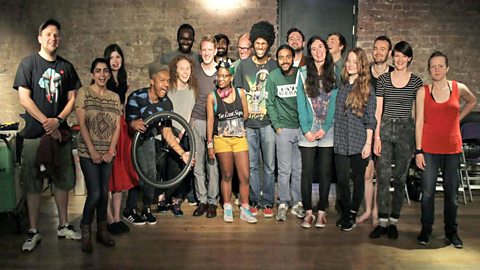what it like to be in prison for life
What is it really like to be in prison house?
"Past the time I arrived at the gates, I felt similar I'd already lost who I was. All I can remember is telling myself over and over not to weep," says Brenda of her commencement twenty-four hour period in prison.
She'due south sharing her experiences in a new podcast, The Secret Life of Prisons, that aims to dispel myths virtually everyday life in jail.
BBC Radio 4's Law in Action spoke to some of the former prisoners taking role in the podcast to detect out how they retrieve it will change perceptions of life inside.

Arrival
When she was transported to prison house, Brenda says she remembers wanting to seem braver than she felt.
"I remember getting in the van and everything was moving then slowly outside. I was trying to look out the window and catch every final glimpse I could of the outside world, of normal people. It felt actually official - anybody in the van was labelled. Nosotros were criminals."
During her search on inflow, she says an officer asked her to remove her clip-in weave.
I know that prison is about punishment... I merely wish people didn't take this misconception that it'due south a holiday army camp.
"I had to give her my hair, and when I was sent to join the other inmates after my search, a lady I'd travelled with in the van said she barely recognised me."
She says she felt as though her identity had been "stripped abroad" on arrival.
"I just want people to know how nosotros actually feel going through those gates, we're non proud," she explains.
"Yous've non got your brand-upwards, your dainty pilus, your shoes - none of the petty things you take for granted that make you experience like you lot. I know that prison is near punishment and that's a part of it - I just wish people didn't take this misconception that it'southward a vacation military camp."
Ways of coping
Since completing her sentence, Brenda is has become a poet, running a platform that she says aims to assist other artists who have been involved in the criminal justice arrangement.
She says she started writing poetry in prison equally a way of expressing her emotions.
"I lost all my faith when I was in prison - I used to have organized religion in God, but I couldn't encounter how this could possibly be His programme for me," she explains.
"I was rude to other inmates who tried to make friends with me. When a lady asked if I wanted to bring together her choir, I told her to leave me alone, find someone else to badger.
"The newspapers just show prisoners reoffending, never changing their ways - and I thought that would exist me.
"One nighttime, I started writing my thoughts down on a chip of paper in my cell. Instead of saying my thoughts out-loud and confront getting written up by guards, I'd write them down. It became a form of therapy for me - it gave me hope."


Helping other inmates
David, a former prisoner and at present reform campaigner, says his way of coping with life on the within became through helping other inmates.
He decided he wanted to volunteer equally a 'Listener' with Samaritans. The scheme trains prisoners to go 'listeners' that offer help and back up to other inmates at risk of self-harm and suicide.
"I remember going to run across one inmate who was ready to have his own life. He wanted to do information technology that day," David explains.
"We talked things out - he told me his cell neighbor was aggressive and would dial the wall, which kept him upwardly and frightened him.
"When I asked him what he liked to do, he said he liked cartoon. I spoke to the mental health aid worker who was working with me and we got him some fine art supplies.
"I was worried that dark that he might endeavour to take his own life, merely I was called to his cell the next day.
"Next matter I know, he brings out these two drawings he'south made, hands them to me and says: 'David, instead of killing myself, I coloured these for y'all.'
"I tin can't quite describe how that fabricated me feel - it's one of the nigh positive memories of prison house for me."

A turning betoken
David says the listener scheme has been important to him because of his own experiences during his time inside. In 2009, he says he attempted to take his ain life in prison house.
I'chiliad not proud of the things I did, merely my experience of prison means I care well-nigh the justice organization and making sure people can and exercise change.David, a former prisoner and now reform campaigner
"A friend establish me in my cell - I'd overdosed and I was well-nigh dead."
His friend raising the alarm meant David was able to go life-saving treatment.
"I don't quite know how I survived and got through it, merely it was a real turning point for me," he says.
He says that without prison, he wouldn't be the person he is now.
"Don't get me incorrect, there were really bad times - and the visits especially were awful," he says. "In that location'due south all this build-up beforehand and you don't actually know what to say to them when you see them. You end up in uncomfortable silence.
"Just prison house was making me such a meliorate person - I was living a life of criminal offense, and I needed to change information technology," he says. "I know that people within are criminals, but I do think a lot of people exterior view prisoners from a place of fear. People in prison are withal people, and it'southward in everyone's interest for the justice system to work and rehabilitate them properly."
"It definitely did that for me. I'thousand not proud of the things I did, simply my experience of prison means I care about the justice system and making sure people can and do change."
A take a chance to reflect
For Brenda, prison house gave her the chance to reflect.
"In jail, I was able to sit down and really reflect on my life and what I did," she explains. "Now, I merely want that take a chance to prove myself - I want to work hard, I want to volunteer and give back. Your neighbours, your cleaner, your colleague - they might be ex-prisoners."
"If you share the stories of people like David and myself, you lot show simply how far you can come and that there is hope of turning things effectually," she says.
Listen to Law in Activeness
More from Radio four
Source: https://www.bbc.co.uk/programmes/articles/52XBpzxsQx7xRRRRMKflByd/what-is-it-really-like-to-be-in-prison
0 Response to "what it like to be in prison for life"
Post a Comment